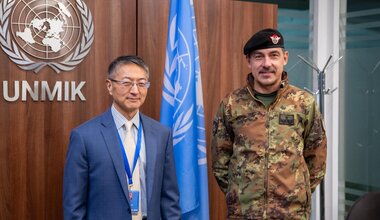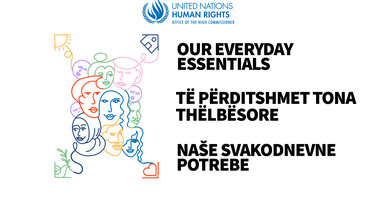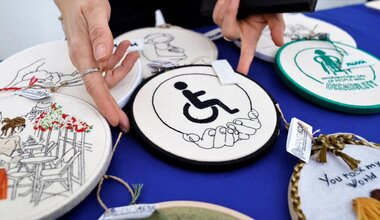10 Dec
2015
The right to know the truth about past violation
On the occasion of International Human Rights Day today, Miriam Ghalmi, UNMIK's Senior Human Rights Advisor delivered a presentation on the right to know to the associations of families of missing persons. The following is Ms. Ghalmi’s speech:
I am happy to be with you today, as it coincides with the International Human Rights Day. It is celebrated worldwide and numerous events are currently taking place in different parts of the world. The 10th December is even more important in post conflict environments because History has proved that Peace and Reconciliation can only be built through Truth and Justice …
In post-conflict societies, the right to know is crucial. By “right to know”, I mean: the right to know the truth about past human rights violations. This is especially true in the case of missing persons as a result of a conflict.
1,670 persons remain unaccounted for following the conflict in Kosovo. A lot has been achieved: information has been shared, mass graves have been found, bodies have been identified, families have been informed of the fate of their loved ones. However, I repeat, 1,670 persons remain missing more than 15 years later.
Those missing should not be forgotten. Their families have the right to know. The right to know in which circumstances their loved ones disappeared, what happened to them, where their bodies have been left. They also have the right to know the responsibility behind the crime, and to know that there will be no impunity.
Without the certainty of the death of their missing relatives, haunted by images of what could have happened to them, families cannot mourn. Time will not help them. One, ten, twenty years later, they need to know, no matter what - that’s their right.
What is true at the personal level is also true at the collective one. In the context of transitional justice, a community or society needs to establish the facts and to fully know its past in order to look forward and build a lasting and sustainable peace. A community or society needs to know the truth about human rights violations and abuses suffered by its members. But it also needs to acknowledge the human rights violations that it had caused to other communities. The full truth, not a selective memory, in a spirit of reconciliation.
In the Working Group for Missing Persons, Pristina and Belgrade delegations share information and they work together to shed light on the fate of the remaining missing persons, under the chair of the International Committee of the Red Cross. A new site is being right now investigated in Kizevak in the Raska municipality.
Yesterday, during the last session of the Working Group, both delegations reiterated their commitment to continue their work as long as civilians remain missing. The process is not easy, and it must not be politicized.
On the occasion of the Human Rights day that we are marking today, it is important to remember that Human Rights, including the Right to Know, are not only moral values, but first and foremost, legal international instruments that are reflected in the Kosovo Constitution.
 UN
UN United Nations Peacekeeping
United Nations Peacekeeping





